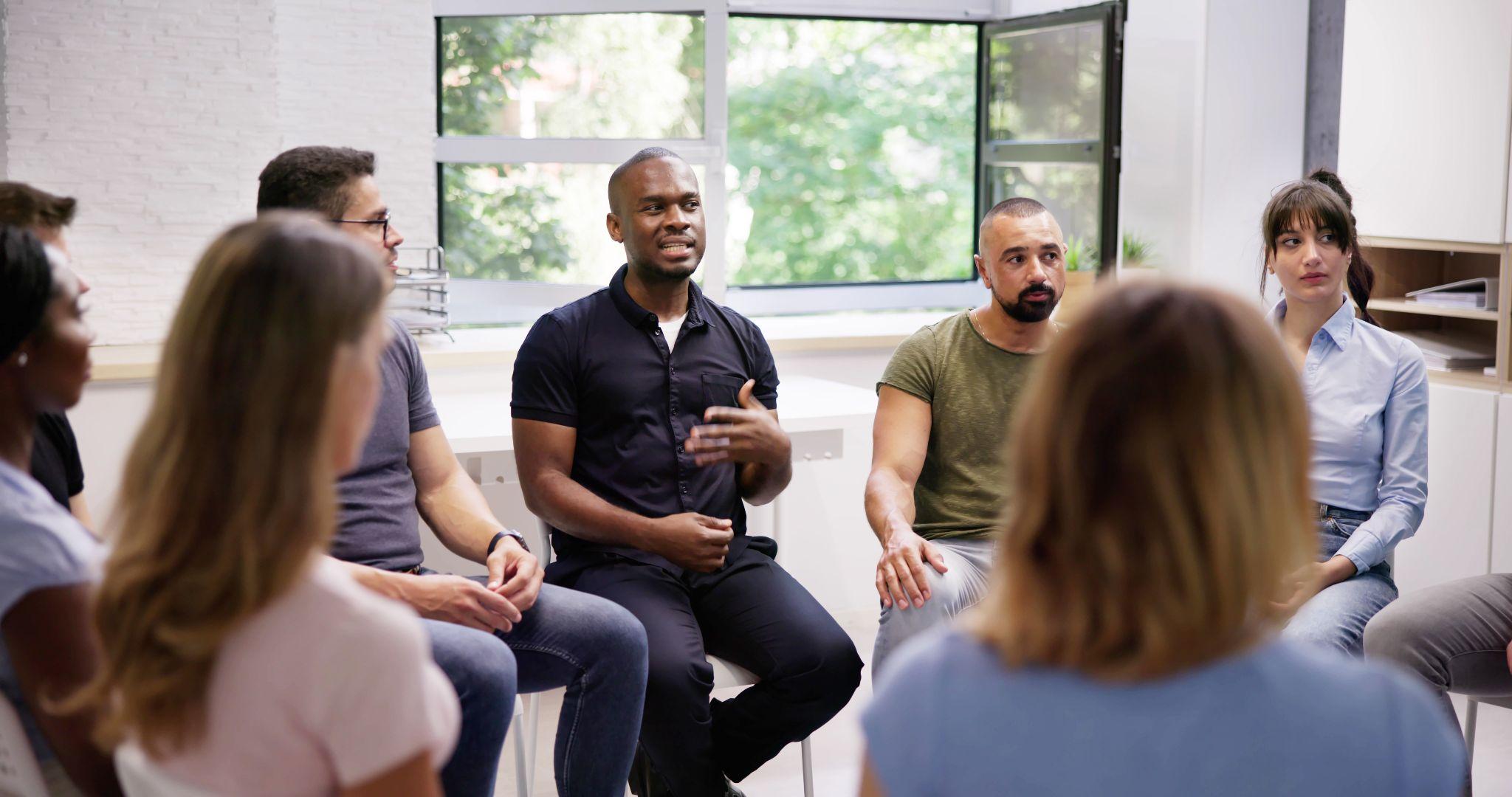The power of group therapy for addiction recovery can be transformative. There’s a saying often heard in addiction circles: “We’re only as sick as our secrets.” In the safe and supportive environment of addiction therapy groups, individuals can share their struggles and vulnerabilities without fear of judgment. By bringing hidden thoughts and feelings into the open, people can begin to heal, finding strength and comfort in the shared experiences of others.
It’s natural to feel some confusion or hesitation about how group therapy can aid in addiction recovery. Many individuals struggling with substance abuse fear the isolation that addiction brings and the vulnerability required to share their deepest, darkest secrets in a group setting. You might wonder, “Can I really be that honest with so many new people? How can sharing in a group possibly help my recovery?”
The first step is finding the right group therapist or facilitator. It’s essential to choose someone who understands how to effectively use group dynamics for healing and approaches the process with empathy and compassion. A good facilitator balances authority with a gentle and respectful tone, creating a safe space for everyone to share openly.
Once you find a group that aligns with your treatment goals, remember that your experience and healing are within your control. Being open and sharing a part of yourself is crucial. If you hold back, it may be difficult for the group to provide the support you need. The key to benefiting from addiction group therapy lies in your willingness to show up, be seen, and participate. Your path to recovery starts with taking that brave step to share—often, the answer is in your own hands.
What Is Group Therapy?
Group therapy is a specialized counseling approach designed to help individuals address psychological challenges, such as substance abuse and other mental health issues. Sessions typically involve 6–12 participants, along with one or two therapists trained in group dynamics.
These therapists provide professional support by guiding discussions, ensuring every voice is heard, and encouraging members to draw strength, build connections, and gain insights from each other’s experiences. This collaborative environment helps break the isolation often caused by addiction, creating a sense of belonging and mutual support.
When you first join a group, the therapist will invite you to introduce yourself and share some of your thoughts or experiences. This helps establish an open and welcoming atmosphere, allowing you to begin building trust with others. By sharing and listening, you contribute to a supportive community where everyone feels understood and valued.
What Are the Benefits of Group Therapy?
Some may worry that group therapy for drug addiction or alcohol addiction won’t be as effective as individual therapy due to less one-on-one time with a therapist. However, group therapy can be just as impactful, if not more so, because it mirrors the social world we live in. Group therapy reflects real-life interactions and teaches us valuable lessons, which we’ll cover below.
You Are Not Alone
This realization is crucial for individuals struggling with substance abuse, who often feel deep shame and guilt. These emotions may originate from past trauma or abuse that they’ve never felt safe enough to share, leading them to believe, “I’m the only one going through this.” In group therapy, connecting with others facing similar challenges can offer immense comfort and a powerful sense of belonging.
You’ll Solve Problems Together
When individuals share their struggles and work collaboratively to find solutions, they create a bond of trust. This shared experience breaks down feelings of isolation and builds a supportive community where members learn from each other and share ways to cope with the ups and downs of life. Being connected to others, who genuinely understand your challenges, can provide the encouragement and motivation needed to stay committed to your recovery journey.
You’ll Improve Your Communication Skills
Reflecting on and sharing your journey and successes invites valuable feedback and advice. If someone misunderstands you, it provides an opportunity to refine your communication skills and how you interact with others. In a group setting, you also learn to practice active listening and empathy, which enhances your ability to respond thoughtfully and with emotional openness, encouraging more authentic relationships.
How to Get the Most Out of Group Therapy
You deserve to be seen and heard. Here are some ways to help you get the most benefit from attending group therapy for alcohol addiction or drug addiction.
Be Open and Honest
Being around others who share your feelings can inspire bravery and honesty. Even sharing just one sentence about how you feel can encourage more reserved members to open up. The more you share honestly, the more support you’ll receive from the group. As you express yourself, you’ll begin to heal, and start to gain insights into your experiences, marking the start of your journey to rediscovering yourself.
Respect the Privacy of Fellow Members
Confidentiality is crucial for creating a safe and trusting environment where everyone feels secure sharing their experiences. It takes courage to open up about sensitive, private matters, so it’s important to be respectful and considerate of both yourself and others.
Listen to and Support Others
Simply being present and genuinely listening to someone with similar struggles can make them feel seen and valued. Your attentive listening and support can offer fellow members the confidence and encouragement they need to remain committed to their challenging journey toward wholeness.
Be Patient With the Process
Sharing your thoughts and feelings with strangers may feel awkward at first, but over time it will likely become easier and more meaningful. Embrace the process with kindness towards yourself and others. Each session is a step toward understanding and healing. Trust that, with time, you will grow stronger, more resilient, and closer to your goals.
Group Therapy at Lumina Recovery: Discover Your True Voice
At Lumina Recovery, our group therapy sessions are thoughtfully designed to forge deep connections among participants. Here, stories are shared, challenges are understood, and victories are celebrated together. Our dedicated therapists create a nurturing environment where honesty, empathy, and understanding are at the heart of every session. In our addiction therapy groups, you’re not just engaging in therapy—you’re becoming part of a supportive family that grows together, guiding you toward a brighter, addiction-free future.
Reach out to our team today. We are here to support you on your healing journey and help you achieve true transformation.



